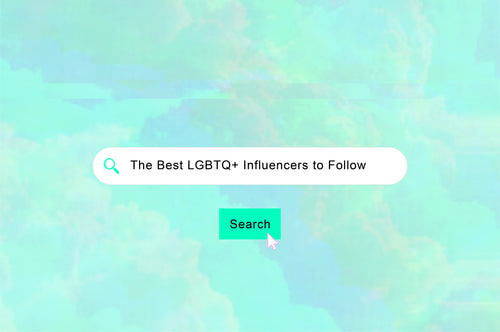
ooops... your cart is empty.
Time to glow...
✋Click, Hold & Drag your products here
Shipping
Free Delivery for orders Over £30
Next Day delivery available
by Elise Parkes |
For those of you who are neurotypical, when you think of an autistic person, who automatically comes to mind? Is it someone you know? Or a depiction of an autistic person on tv and in the media? An autistic character most likely written and played by a neurotypical person? (yep, 95% of the few disabled roles that do exist are currently played by nondisabled actors, despite 20% of the population being disabled and 1 in 54 autistic[1]) So, what does that mean, and have you ever thought about the negative impact this can have on the autistic community?
When we spoke to Aamani, member of our Glow Collective and an autistic person herself, the depiction of autism in the media and the danger that has, was one of the first things she mentioned. People with autism simply are not well served when it comes to seeing themselves reflected in the media.
Take the 'classic' Rain Man, depicting someone with savant abilities, whose existence simply steers plot, helping the neurotypical person learn an invaluable life lesson as a result. Yes, this was released in 1989 but that doesn’t mean movies and tv shows are any more accurate. It’s easy to think of some more recent examples... The white, socially unaware male genius, sounds familiar right? ABC’s The Good Doctor. Neftlix’s Sam in Atypical (especially in the earlier seasons.) Perhaps Sheldon Cooper from Big Bang Theory? And that’s before we even get into speaking about why having autistic characters played by someone who is not autistic is a problem… Paige Layle[2] says it best… ‘if you think someone who is not autistic can act autistic better than someone who is autistic… you’re wrong and need to recognise your own ableism.’ And the ableism in the next film to disucuss (and the response of its director) has been accused of taking this to the next level.
If any of you heard even a glimpse of this controversy last year, you’ll have seen this coming. Sia (the Australian pop star) film ‘Music’ stars Maggie Ziegler as a non-speaking autistic girl, and from the trailer alone it quickly became clear how badly handled and researched the making of this film was. For a rounded discussion from autistic people themselves, I’d recommend reading the references below, discussing the ableist gaze, unsettling depictions that verge on mockery, lack of autism knowledge and harmful oversights. Sia’s responses themselves lead to further discussion, her trust in Autism Speaks (a group that treats autism as a disease to be eradicated), and her response when someone questioned why she didn’t hire an autistic actress to play Music - she tweeted “Well maybe you’re just a bad actor.”
As Aamani mentioned, this ableism in arts does the Autistic Community a disservice. No, not all autistic people are white men with savant abilities. And no, neither are they all nonverbal. In fact, for many girls, a diagnosis is difficult to get until much later in life, they often become proficient in masking their autism, meaning they don’t get the help or support they need. When it comes to the portrayal of Autism in movies and media Charlie Hancock summaries it perfectly - ‘These are not our own stories. They are written by neurotypical writers who may have only undertaken shallow research and apply so much artistic licence they bear no reality to the lives lived by autistic people. This is then brought to life by neurotypical actors who treat our disability as a costume which may just nab them a gold statuette come awards season.[3]’
Autism is so different for each person, there’s never going to be one character, or one portrayal that accurately represents every autistic person. There’s not now and there never will be. However, that simply means there needs to be a broader of plethora of complex characters that authentically represent the autistic people with enough depth and diversity. So how do we get there? Sophie Buck says it right -.’ Only autistic people have the knowledge to create these meaningful representations and we need to be closely involved in writing these stories. ’ So, it starts with inclusion, elevating voices and listening and Aamani agrees ‘there needs to be more ways that autistic people can have their voices heard.’ To conclude, as autistic actor Mickey Rowe highlights: “inclusion in the arts matters because it leads to inclusion in life.[4]”
Research, quotes and inspiration for this article came from Aamani, member of the Glow Collective as well as:
Paige Layle https://www.youtube.com/watch?v=Oa2EF8z2OM0
Charlie Hancock https://www.oxfordstudent.com/2020/12/06/autism-on-screen-where-sia-went-wrong/
Clem Bastow https://www.theguardian.com/film/2021/jan/27/sias-film-music-misrepresents-autistic-people-it-could-also-do-us-damage
Sophie Buck https://www.dazeddigital.com/film-tv/article/51253/1/autistic-person-responds-sia-film-music-maddie-ziegler-autism-speaks
Brady Gerber https://www.vulture.com/article/autism-spectrum-adult-characters-tv-analysis.html
Mickey Rowe https://www.huffpost.com/entry/sia-maddie-ziegler-autism-ableism_n_5fbe6693c5b6e4b1ea479753?zvk&fbclid=IwAR0V8Kr8MuJMU9pOzCpaPKLYoS2c1huIS6LECq6zgDpLtEUQ74I9gXFniMQ
Sarah Bradley https://www.vice.com/en/article/j5j8zb/tv-is-obsessed-with-unrealistic-portrayal-of-autistic-people
[1] Mickey Rowe https://www.huffpost.com/entry/sia-maddie-ziegler-autism-ableism_n_5fbe6693c5b6e4b1ea479753?zvk&fbclid=IwAR0V8Kr8MuJMU9pOzCpaPKLYoS2c1huIS6LECq6zgDpLtEUQ74I9gXFniMQ
[2] Paige Layle https://www.youtube.com/watch?v=Oa2EF8z2OM0
[3] Charlie Hancock https://www.oxfordstudent.com/2020/12/06/autism-on-screen-where-sia-went-wrong/
[4] Mickey Rowe https://www.huffpost.com/entry/sia-maddie-ziegler-autism-ableism_n_5fbe6693c5b6e4b1ea479753?zvk&fbclid=IwAR0V8Kr8MuJMU9pOzCpaPKLYoS2c1huIS6LECq6zgDpLtEUQ74I9gXFniMQ
Back to News
-

-
Read More
Related Posts
The Best LGBTQ+ Influencers to Follow Right Now
However you feel about social media, the pros (the cons…) it can’t be denied that places like Ins...